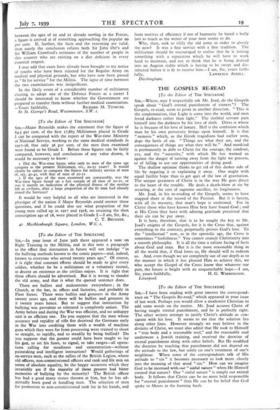[To the Editor of THE SPECTATOR] SIR, —In your issue of
June 30th there appeared a note on Right Training in the Militia, and in this note a paragraph to the effect that instructors in future will not indulge " in the bullying methods known to the comic papers—and, indeed, known to everyone who served twenty years ago." Of course, it is right that constant efforts should be made to give every soldier, whether he be a militiaman or a voluntary recruit, as decent an existence as the civilian enjoys. It is right that these efforts should be advertised. But it is wrong to slander the old army, and that is what the quoted sentence does.
There are bullies and malcontents everywhere ; in the Church, at the bar, in offices and factories, and probably in Fleet Street. There were bullies and grousers in the Army twenty years ago, and there will be bullies and grousers in it twenty years hence. But to suggest that instruction by bullying was prevalent or tolerated is completely unjust. The Army before and during the War was efficient, and no unhappy unit is an efficient one. Do you suppose that the men whose accuracy and rapidity of rifle fire deceived the Germans early in the War into crediting them with a wealth of machine guns which they were far from possessing were trained to shoot so straight, so rapidly, and so steadily by being bullied? Do you suppose that the gunner could have been taught to lay his gun, to set his fuses, to signal, to take ranges—all opera- tions calling for steadiness and concentration—without painstaking and intelligent instruction? Would gatherings of ex-service men, such as the rallies of the British Legion, where old officers, non-commissioned officers and rank and file mix on terms of absolute equality, be the happy occasions which they invariably are if the majority of those present had bitter memories of bullying by the minority? The British officer has had a good many stones thrown at him, but he has ad- mittedly been good at handling men. The selection of men for promotion to non-commissioned rank lay in his hands, and from motives of efficiency if not of humanity he hated a bully just as much as the writer of your note seems to do.
Why, then, seek to vilify the old army in order to glorify the new? It was a fine service with a fine tradition. The militiaman should be encouraged to realise that he is joining something with a reputation which he will have to work hard to maintain, and not to think that he is being drafted into an Augean stable which is having to be swept and dis- infected before it is fit to receive him.—I am, Sir, yours faith-










































 Previous page
Previous page